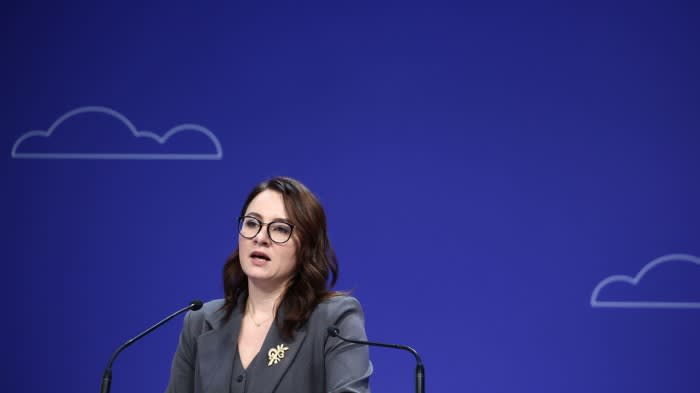Stay informed with free updates
Simply sign up to the War in Ukraine myFT Digest — delivered directly to your inbox.
Ukraine may have to postpone pay for public servants and pension payments to millions of its citizens if the EU and US fail to deliver promised financial aid early next year, its deputy prime minister has warned.
Yulia Svyrydenko, who is also economy minister, said a shortfall in external support would push the Ukrainian economy back into “survival” mode after it staged a recovery in 2023 with gross domestic product growth estimated by the IMF at 4.5 per cent.
“The support of partners is extremely critical,” Svyrydenko said. “We need it urgently.”
The Ukrainian government is racing to cobble together money to pay for public services and benefits after promised funding from its closest allies failed to come through. It needs $37bn in external support next year.
A $60bn funding request by US President Joe Biden’s administration remains deadlocked in Congress while a proposed four-year €50bn EU support package was vetoed by Hungary this month. EU leaders will meet again on February 1 to try to overcome Hungary’s resistance but they are also drawing up alternative plans to channel €20bn to Kyiv, circumventing Budapest.

Svyrydenko said she hoped the EU would approve support in February and deliver the funds before the end of March. But she also said this would not be enough.
Kyiv has been trying to save cash and reprioritise expenditure since September, when western support began to falter. It has increased a windfall tax on banks to 50 per cent and transferred revenues from a 1.5 per cent supplemental income tax from local to central government. But it is already facing a shortfall, the minister said. About $5bn in disbursements from international donors and lenders in December “won’t be sufficient” to cover spending needs.
Svyrydenko said Ukraine would prioritise defence and debt servicing which meant “there’s a huge risk of underfunding of certain social sectors”. Kyiv might have to delay paying wages for 500,000 civil servants and 1.4mn teachers and benefits for 10mn pensioners if foreign aid did not come through, she said.
Some western officials say Ukraine would be able to tide itself over for a few months by borrowing domestically or through monetary financing by the central bank but that could unleash inflation and undermine financial stability.
Deep cuts to public spending or spiralling inflation could derail Ukraine’s economy and weaken its tax base, making the country even more dependent on foreign support. Kyiv raised $4.4bn more in taxes in the first 11 months of 2023 than it did in the same period last year, Svyrydenko said.
The minister pointed out that the EU’s proposed €50bn financing facility included €8bn of guarantees for risk sharing with which Kyiv had intended to attract €30bn of private investment into the economy.
“It’s not just keeping macroeconomic stability itself, but it’s creating the prerequisites for the economy to recover and for Ukrainians to return,” Svyrydenko said.
A sustained recovery was necessary to encourage Ukrainian refugees to come home and further strengthen growth, Svyrydenko said. Although unemployment is estimated at 18.9 per cent, Ukraine is suffering from labour shortages in many sectors.
With Ukraine’s export routes constrained by war and by bottlenecks at EU borders, the government’s strategy is to promote exports of more valuable processed and manufactured goods rather than raw materials.
Ukraine was already gaining economically from breaking Russia’s blockade of the Black Sea, with ships once again able to serve Ukrainian ports along a naval corridor close to the coast. Shipments grew by 70 per cent in November over the previous month, Svyrydenko said. But she appealed for more western air defence equipment to further safeguard the route.
She also urged the new government in Warsaw to end a blockade of Ukrainian border crossings by Polish truck drivers protesting at what they claim is unfair competition from Ukrainian drivers. Ukrainian exporters had lost $160mn because of the Polish protests while losses for importers amounted to $700mn.
